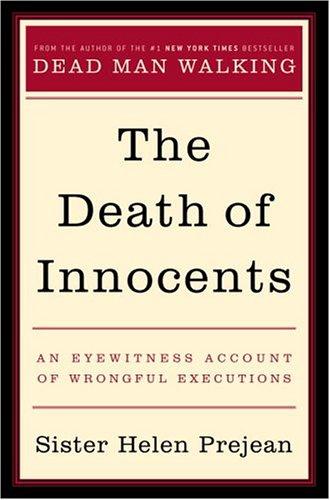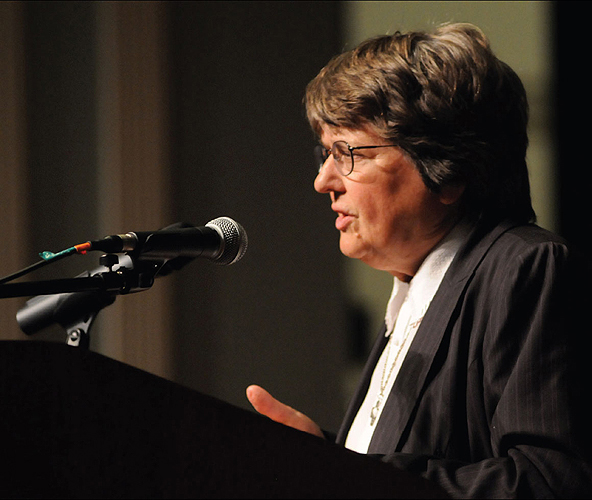|
Helen Prejean was born in 1939 in Baton Rouge, Louisiana, and joined
the Sisters of St Joseph of Medaille in New Orleans when she was
eighteen. While living in the St Thomas housing project, she became pen
pals with Patrick Sonnier, sentenced to die in the electric chair of
Louisiana's Angola State Prison for the murder of a teenage couple. This
led to her becoming the companion and spiritual advisor of Sonnier and
later other condemned men, and launched her lifelong dedication to the
abolition of the death penalty. It also led to her writing the book Dead Man
Walking, which was filmed by Tim Robbins in 1995 and nominated for four Academy
Awards, with Susan Sarandon winning Best Actress.
Sister Helen's second book, The Death of Innocents: An Eyewitness Account of Wrongful
Executions, published last year in the US and just released in a UK edition, is arguably
even more powerful than her first.
In Dead Man Walking Prejean personalised the experience of judicial killing. Sonnier was
a bad man, nobody pretended that he wasn't, the father of one of his victims described him
as 'God's mistake', yet the cold brutality of the way his life was terminated took our breath
away: it was a barbarity in the face of which the light of our collective humanity seemed
dimmed. In The Death of Innocents she looks at a slightly different question and in so
doing presents us with something even more unsettling and obscene: what if a lot of the
men America executes are not bad at all, but are in fact completely innocent? Men whose
crime is to be poor or black, or worse still both, in the wrong US state at the wrong time?
The first of the two cases she considers in detail is that of Dobie Williams, a poor black
man from rural Louisiana with an IQ of sixty-five, who was executed after being
represented by an incompetent counsel and found guilty by an all-white jury on the
flimsiest of hearsay evidence from the murdered woman's husband and some blatant
conjecture and speculation. The second is the case of Joseph Roger O'Dell, a white man
from Virginia, who was again incompetently defended and whose juries were
systematically denied access to important pieces of evidence. These are chilling accounts
of the cynical manipulation of the law to serve prejudice and satisfy public pressure, and
belong in the pages of To Kill a Mockingbird.
Prejean continues from the particular to the general. She shows us how the states that
have the death penalty are also the ones that have large poor black populations and a
history of slavery. Black life in such states is cheap, as it always has been, and few of their
white legislators seriously believe that the same standards of justice should apply to both
races.
Money also buys acquittal. OJ Simpson may have been black but he was far from poor.
The Prosecution can always afford expert witnesses, DNA testing and top notch counsels.
If the Defence can afford even better, as in the celebrity show trials, nobody gets the
needle or the chair. State funded bargain basement Defence, on the other hand, is
practically never a match for what the Prosecution can muster. What Prejean reveals, with
clarity and thoroughness, is a system that condemns to death the innocent and guilty alike.
It is local practice, 'the way we do things around here', not the law, that determines who
lives and who dies. Most of the agenda is wilfully hidden. The notion that it's always the
right person getting the lethal injection or the electric current that fries their brain is a fiction
that a whole society subscribes to because the truth is unthinkable. Between 1973 and
2002, campaigning lawyers and college volunteers have managed to save 122 men from
being falsely executed in America. But how did they come to be convicted in the first place,
and how many of the 1,000 or so others who were executed were also innocent but not
fortunate enough to have their cases taken up by people such as these?
Naturally the perspective from which Prejean writes is American, and also Roman
Catholic, though her arguments are entirely non-religious. It's easy for Europeans, who
have largely abandoned the death penalty, to dismiss the USA as an aberration, a society
with a rugged pioneering past where gun culture is deeply rooted and state violence
accepted casually as an alternative to diplomacy. But the spread of international terrorism
has already produced rumblings in this country of a return to the death penalty for 'certain
categories' of murder. Prejean's central argument is very simple, entirely universal and in
my view irrefutable: Because all judicial systems are subject to human error, the death
penalty inevitably kills individuals who have been wrongly convicted. The error is
irreversible. The acceptance of the killing of innocent people as a necessary price for
getting to the guilty brutalises society and breeds contempt for human life.
If you haven't made up your mind about the death penalty, or even if you have, or if it's an
issue to which you haven't given very much thought, this is the one book that you owe it to
yourself to read. It's a shocking eye-opener.
SEND ME AN EMAIL 
|














